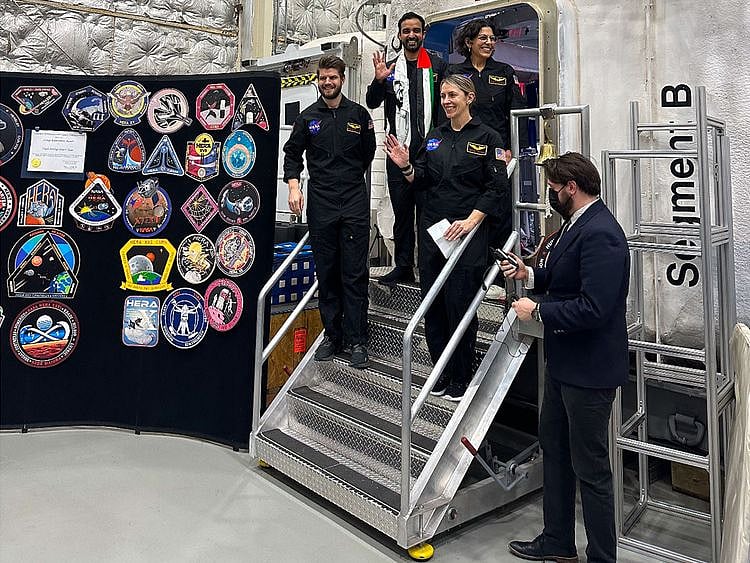Final phase of second analog study complete: MBRSC
Emirati crew member Obaid AlSuwaidi was part of the 45-day mission

Dubai: The final phase of the second analog study under the UAE Analog Programme, as part of NASA’s Human Exploration Research Analog (HERA) Campaign 7 Mission 4. has been completed, the Mohammed Bin Rashid Space Centre (MBRSC) has announced.
Emirati crew member Obaid AlSuwaidi, alongside Kristen Magas, Tiffany Snyder, and Anderson Wilder, concluded their 45-day mission within the HERA habitat at NASA’s Johnson Space Centre in Houston, Texas, US, after egressing from the facility on Monday.
The study, which began on November 1, was designed to simulate the conditions of long-duration space missions here on Earth, providing insights into human adaptability to isolation, confinement and remote conditions. The HERA habitat, a three-storey facility, served as the setting for this Earth-based simulation, which replicated challenges similar to those faced during missions to Mars and other deep-space destinations.
The crew undertook a variety of experiments, including a simulated “walk” on Mars using virtual reality, along with activities like cultivating vegetables and shrimp farming. The crew also experienced communication delays of up to five minutes with Mission Control, simulating the increasing time lag expected during interplanetary travel.
Following their egress, the crew will remain at Johnson Space Center for a week to complete post-study surveys, debrief with HERA managers and scientists, and provide data essential for studying crew health, performance, and dynamics under simulated spaceflight conditions.
Salem Humaid AlMarri, Director General, MBRSC, said, “The successful completion of the second analog study under the UAE Analog Programme exemplifies the UAE’s commitment to driving strategic advancements in human space exploration and research. By forging strong international partnerships such as that with NASA and fostering innovation through our academic collaborations with universities in the UAE, we are not only contributing to global scientific progress but also positioning our nation as a pivotal player in shaping the future of space exploration. These efforts align with our broader vision to lead in addressing the challenges of deep-space missions and to solidify our role as a catalyst for transformative solutions in the global space sector.”
Adnan Al Rais, Assistant Director General - Space Operations and Exploration Sector, MBRSC, said, “The completion of this study represents a critical step in advancing our understanding of the physiological, psychological, and operational challenges associated with long-duration space missions. By participating in this analog study, we are refining methodologies to enhance crew performance, mitigate risks, and optimise mission outcomes for interplanetary exploration. Obaid AlSuwaidi’s involvement underscores the UAE’s commitment to contributing valuable data and expertise to the global space community, ensuring that future missions to the Moon, Mars, and beyond are grounded in rigorous, evidence-based preparation.”
The analog study comprised 18 human health experiments conducted during the mission, focusing on physiological, behavioural and psychological responses in isolated and confined environments. These experiments, six of which were led by MBRSC in collaboration with UAE universities including the United Arab Emirates University (UAEU), Mohammed Bin Rashid University of Medicine and Health Sciences (MBRU), and American University of Sharjah (AUS), underscore the UAE’s commitment to fostering scientific innovation and knowledge in preparation for future long-duration missions.
Obaid AlSuwaidi, Analog Crewmember, reflecting on his participation, said, “This study has been a transformative experience addressing the complexities of long-duration spaceflight at the HERA facility at NASA’s Johnson Space Center. It has been an honour to represent the UAE in this international effort, and to contribute to research that will pave the way for future explorers.”
The second analog study under the UAE Analog Programme is part of a four-phase initiative aimed at enhancing the understanding of human factors in spaceflight. The final phase concludes a year-long effort that has seen the UAE take a leading role in advancing global space research. The insights gained will not only shape the future of interplanetary exploration but also inspire a new generation to push the boundaries of human potential.
Sign up for the Daily Briefing
Get the latest news and updates straight to your inbox
Network Links
GN StoreDownload our app
© Al Nisr Publishing LLC 2026. All rights reserved.